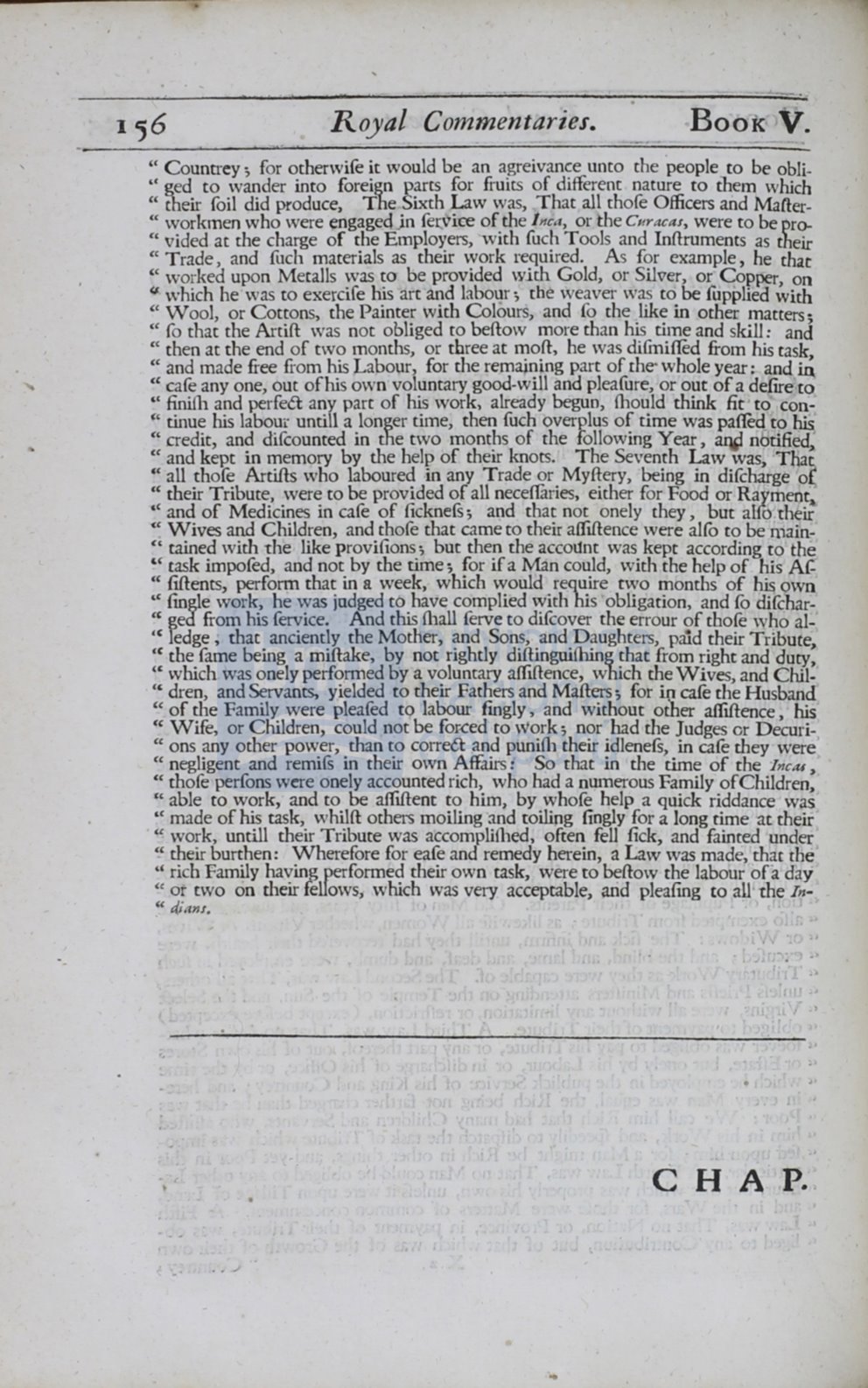

Royal
Commentaries.
' Countrey; for otherwife it would be an agreivance unto the people co be obli–
,, ged to , ander
into
foreign pares for fruics of different nature to cbem
which
' their
foil
did produce, The Sixth
Law
was, That all rhofe Officers and
Marter–
" workmen who were engaged jn fe vire of the
1nca,
or the
Cur acaf,
were to be pro–
c,
ided at the charge of die Employers,
ith fuch Tools and Infirumencs as their
" Trade , and fuch materials as their work required. As for example, he chat
(<worked upon Mecalls
as
to
be provided with Gold, or Silver, or
Cop~r,
on
~
which he
V\
as
t0
exercife his arc and labour; the
ea er
\'\'as
to be fupplied with
"Wool, or Cottons, the Painter with Colours, and
fo
the like
in
other matters·
cc ((
that the Artift was not obliged
to
beftow more than
his
time and
skill:
and
cc
then at the end of two months, or three at moft, he was difiniffed from
his
task
cc
and made free from
his
Labour, for the remaining part of rhe· whole year: and
ui
" cafe any one, out of
his
ov. n voluntary good-will and pleafure, or out of a deftre to
'' fuillh
and perfett any part of
his
work, already begun, !hould
think
fit
to con–
,, tinue
his
labom untill a longer time, then fuch overplus of time was paffed_to
his
c'
credit, and difcounted
in
the
t\VO
months of the following Year,
~
notified,
cc
and kept
in
memory
by
the help of their knots. The Seventh
Law
was,
That;
"all thofe
Artifts
who laboured
in
any Trade or Myftery, being in difcharge of
cc
their Tribute, were c
o beprovided of all nece!faries, either for Food or
R~ymen~
~'
and of Medicines
in
ca.feof ficknefs; and that not onely they, but aifo their
«
Wives
and
Children,
andthofe that came co their ailill:ence were
alfo
to be niain–
cc
rained with the like provifions; but then the account was kept according to
the
'' task impofed, and not by the time; for
if
a Man could, with the help of his
Af–
cc
fifients, perform that
in
a week, which would require cwo months of
his
own
<'
fingle work, he was judged co have complied with his obligation, and fo difchar–
cc
gea from his fervice. And this fhall ferve
to
difcover the erro
ur ofthofe , ho
al–
'' ledge , that anciently the Mother, and Sons, and Daughters,
pa.idtheir Tribute,
cc
the fame being a millake, by not rightly
dillingui{hing
that f
rom right and
ducy,
u :
which was onely performed by a voluntary affifience, which the Wives, and Chil–
,, dren, and Servants, yielded to their Fathers and Mafiers; for
in
cafe the Husband
cc
of the Family were pleafed to labour fmgly, and without other affill:ence ,
his
" Wife, or Children, could not be fok<:ed to work; nor had the Judges or Decuri–
" ons any other power,
than
to correlt and punifh their idlendS,
in
cafe they were
cc
negligent and remi[s
in
their own Affairs
:
So
that
in the time of the
I nca1
,
cc
thofe perfons were ooely accounted rich, \: ho had a nwnerous Family ofChildren,
-''able to work, and to be affill:ent to him, by whofe help a quick riddance
was
'' made of
his
task,
whilO:
others moiling md toiling
fingly
for a long time at their
" work, untill their Tribute was accomplifhed, often fell fick, and fainted under
<c
their burthen: Wherefore for eafe and remedy herein, a
Law
was made, that the
<
rich Family having_ performed their
o~
n task, were to bellow the labour ofa
day
' or two on their fellows, which was very acceptable, and pleafing to all the
In–
,,
d.imu .
CH AP.
.
.,
./














